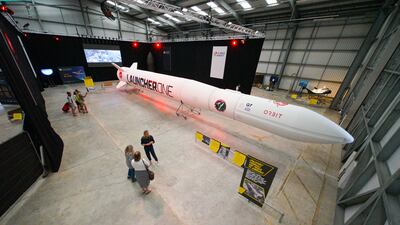British manufacturers specialising in the space sector and other industries are flocking to Spaceport Cornwall to seize unprecedented opportunities before the UK’s maiden horizontal satellite launch.
Excitement is building with only weeks to go until Virgin Orbit’s Launcher One takes off from the airport in south-west England, carried on the wing of a modified Boeing 747 aircraft named Cosmic Girl.
Melissa Thorpe, chief executive of Spaceport Cornwall, at Newquay Airport, said her team is looking beyond the first satellite launch with a vision to become an international space transportation centre. Companies specialising in technology have shown a keen interest to get in on the action.
“We’re really close now to the first ever launch," she said during a discussion on the opening day of the Farnborough International Airshow. "It’s all systems go literally here.
“We’re using satellites very much as a catalyst to attract other technologies, other businesses, whether they’re space or not, to come and be part of the story and be part of that journey.
“What we’re seeing already is a huge intake of that. Something that we thought might happen five years after our launch is happening now before we’ve even had that first launch. While we were somewhat worried in the pandemic [to see] where the market was going to go, we’ve seen quite the opposite. We’ve seen a lot of interest in getting involved and that’s something that we’re working on really hard now, making sure they have what they need onsite to enable them in the future.”
Ms Thorpe said Spaceport Cornwall takes its responsibility seriously, given that spaceports are a gateway to the international realm, and stressed that the UK must make sustainability the cornerstone of its agenda if it is to be recognised in the international space domain.
At the end of August Virgin Orbit, a group led by British billionaire Sir Richard Branson, will use the small airport in Cornwall as a take-off point for its microsatellite. The Kernow Sat 1, a satellite designed and made in Cornwall, will be propelled into space.
The mission aims to examine damage to the Earth caused by climate change, including mapping deforestation and tree planting, coastal erosion and the level of plastic pollution in oceans.
The UK’s first orbital launch has generated a huge amount of excitement in the space industry and offered hopes of new opportunities for the country.
Paul Cremin, commercial spaceflight regulations and policy lead at the UK’s Department for Transport, said Britain recently published its regulatory framework for commercial spaceflight activities, which he said has “allowed immense interest and opportunities for commercial business to exploit the area of space for the purposes of commercialisation and economic growth”.
Speaking at a virtual session alongside Ms Thorpe at Farnborough, Mr Cremin said Britain looks set to attract business from across the Atlantic.
“We are already seeing US operators seeking to operate outside of the US and into the UK,” he said.
He said recent issues such as freight being held up at ports had highlighted the challenges posed to sea transport which could be avoided by space transportation.
“We live in a day where we want things now,” he said. “We don’t want things [in] two weeks’ time, we want them now, we want them [to be] accessible.”
He said the UK must work out how to integrate commercial spaceflight safely into its existing spaceflight system and said there was also a need for a set of common international safety standards.
“We may operate in space but we have to travel through complex airspace in some areas and back through complex airspace to deliver those benefits that everybody is so much looking forward to,” he said. “So there will be challenges about maintaining safety, maintaining a flexible operating mantra in terms of how we safely integrate this in a very complex and diverse aviation and space environment.”
Dr George Nield, chairman of the Global Spaceport Alliance said point-to-point transportation through space “looks like it is right around the corner”. However, he said there were challenges on the road to developing such a capability.
“What we are talking about is high-speed long-distance transportation initially for cargo, but eventually for people, that will allow us to travel from any point on Earth to the opposite side of the planet in just an hour or two,” he explained. “We believe that such a capability will be a real game-changer, not only for national security missions but also for economic competitiveness.”




























